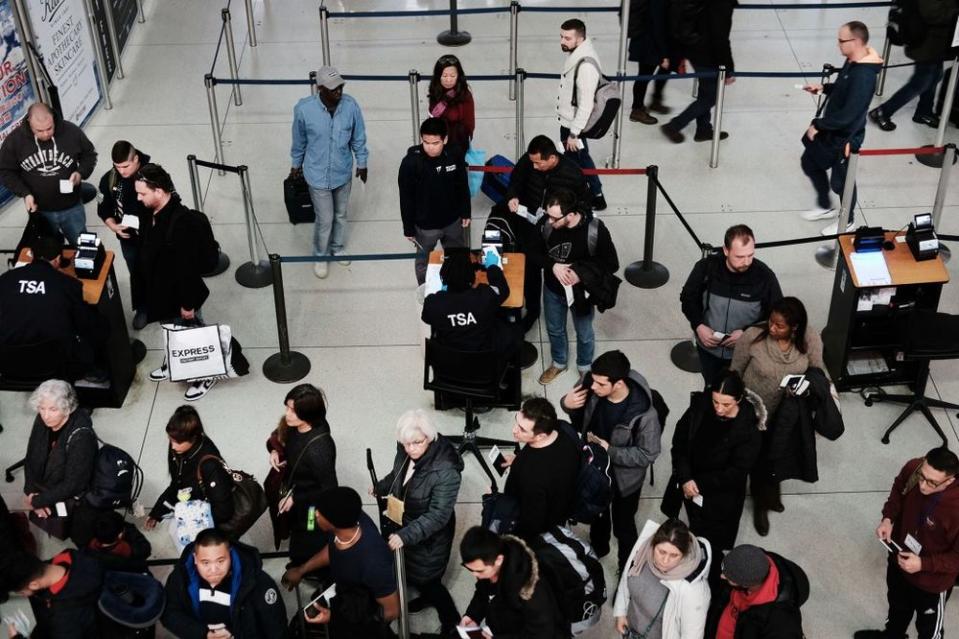TSA Confirms 'Sick Out' Affecting Airports: What to Know Before You Travel During the Shutdown
The government shutdown is having a major impact on the country’s airports. Here’s everything you need to know before you travel.
As the longest shutdown in U.S. history continues, more agencies are feeling its impact. While airlines are privately owned and can continue to operate, an estimated 51,000 TSA agents are among the 800,000 government employees who are expected to show up to work without receiving a paycheck.
Earlier this month, CNN reported that hundreds of agents were calling in sick at airports across America in the wake of the shutdown, something the TSA initially denied. Department of Homeland Security spokesman Tyler Q. Houlton tweeted, “Security operations at airports have not been impacted by a non-existent sick out. CNN has the cell numbers of multiple @TSA public affairs professionals, but rather than validate statistics, they grossly misrepresented them.”

On Tuesday, however, the TSA said in a statement that they are experiencing more than double the normal number of call outs (a national rate of 6.8 percent unscheduled absences, compared to 2.5 percent at this time last year).
Both Miami and Houston International Airports have shut down some TSA checkpoints — with Houston closing an entire terminal — to try and get ahead of potential issues posed by the shutdown, USA Today has reported.
The escalating issues have left many travelers concerned.
According to a poll conducted by airfarewatchdog.com, 62 percent of flyers said they were concerned about their safety during the shutdown, while 47 percent responded that they believe airlines should be required to pay for private security during the pause in government funding.
However, the TSA maintains that flying is as safe as ever.
“Security standards will NOT and have NOT been compromised,” Bilello wrote on Twitter on Jan. 11. “TSA has and will continue to maintain security standards at our nation’s airports. #NotOnOurWatch.”
Even if passengers are weary of flying during the shutdown, they can’t always change their travel plans. If you’re planning on flying during the shutdown, here’s what you should know.

Get to the Airport Earlier Than Usual
While delays vary based on airport, Shannon McMahon, travel expert and editor for SmarterTravel.com tells PEOPLE that travelers should get to the airport around an hour earlier than they nearly would. (TSA recommends two hours for domestic travel and three hours for international travel). “Larger airports have been the first to see long wait times or close terminals as TSA workers stay home,” McMahon says.
Potential wait times depend on the day of the week you’re flying, and weekends and holidays (and holiday weekends, like the one coming up) are busier than flying in the middle of the week.
Regardless of when you’re traveling, “leave extra time to get through security,” McMahon says.
Expedite Your Security Experience
While lines may be long, travelers can sometimes help make their security as streamlined as possible. McMahon recommends making sure you’re following the TSA’s 3-1-1 liquids rule when packing — keeping fluids under 3.4 ounces and in a zip-top quart size bag so passengers can “speed through the line without being stopped.” While in line, McMahon also recommends having easy access to your laptop and other large electronic devices so you can remove them from your carry-on without difficulty and won’t require extra screening.
Don’t Always Trust the Published Wait Times Online
Some airports do post their wait times online. (New York’s LaGuardia is one). Passengers can also share their wait time on the MyTSA app, and view a chart of the average wait times at a specific airport, says McMahon. But, she councils, you shouldn’t rely on them completely. “It’s not a 100 percent guarantee, so it’s better to leave some extra time in case delays suddenly increase,” she says.
Consider that TSA Pre-Check May Not Be Open
If you have TSA pre-check, you might not be able to head to your typical expedited screening lane during the shutdown if there’s a decrease in staff at your airport. “TSA Pre-Check users want to consider whether or not a Pre-Check lane will be available while there are staff shortages,” McMahon says. “It’s a good idea to leave extra time like everyone else.”
Stay Aware and Try to Be Patient
Although TSA ensures that security has not been compromised by the lapse in funding, McMahon says it’s important for travelers to “stay alert at the airport as security workers are busier than usual.”
McMahon reminds travelers to be patient with TSA agents as they’re working without pay to keep everyone safe.

